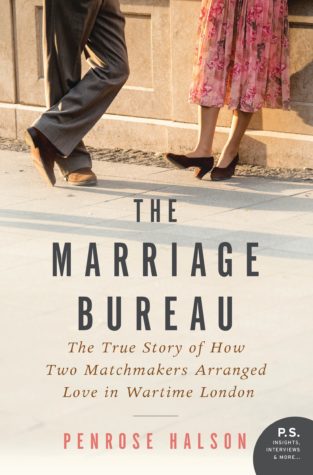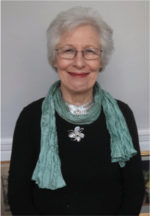Excerpt: The Marriage Bureau by Penrose Halson
 The Marriage Bureau: The True Story of How Two Matchmakers Arranged Love in Wartime London by Penrose Halson
The Marriage Bureau: The True Story of How Two Matchmakers Arranged Love in Wartime London by Penrose Halson Published by William Morrow Paperbacks on May 2nd 2017
Pages: 352
Buy on Amazon US, Buy on Amazon UK

A riveting glimpse of life and love during and after World War II—a heart-warming, touching, and thoroughly absorbing true story of a world gone by.
In the spring of 1939, with the Second World War looming, two determined twenty-four-year-olds, Heather Jenner and Mary Oliver, decided to open a marriage bureau. They found a tiny office on London’s Bond Street and set about the delicate business of matchmaking. Drawing on the bureau’s extensive archives, Penrose Halson—who many years later found herself the proprietor of the bureau—tells their story, and those of their clients.
From shop girls to debutantes; widowers to war veterans, clients came in search of security, social acceptance, or simply love. And thanks to the meticulous organization and astute intuition of the Bureau’s matchmakers, most found what they were looking for.
Penrose Halson draws from newspaper and magazine articles, advertisements, and interviews with the proprietors themselves to bring the romance and heartbreak of matchmaking during wartime to vivid, often hilarious, life in this unforgettable story of a most unusual business.
“A book full of charm and hilarity.”—Country Life

In 1938, farmer’s daughter Audrey Parsons was staying with her uncle, a tea planter who managed a remote plantation in the hills of Assam. Audrey was twenty-four, pretty, petite and fragile-looking, with a pink and white complexion, dark hair, big brown eyes and an infectious laugh.
Six years earlier, after a whirlwind romance in England, she had sailed out to India to marry a young man who worked for her uncle. When she had first met him in England, Peter had seemed as exciting as Audrey could desire in a husband, and she had been in raptures as they went from ball to party in a dizzying around of gaiety. But in India she found him passionately (for him) and tediously (for her) absorbed in his work, and juvenile, dull and vapid when not busily engaged in planting tea.
“I am sorry, Uncle George,” she had apologized, “but I simply cannot marry Peter. I shall go home and think what to do next.”
Uncle George was exceedingly fond of his vivacious niece, and sympathized since, much as he liked Peter, who was an ideal employee, he could see that she was not cut out for a conventional marriage to a pleasant, straightforward but unoriginal man in a remote and lonely place. Sorrowfully he waved her goodbye, begging her to come back soon to add sparkle to his solitary life. Most of the time he was content, but the isolation of his plantation, miles from any of his handful of European neighbors, sometimes threatened to overwhelm him.
So Audrey had returned to her parents in Cambridgeshire. Her father, a down-to-earth farmer, was dismayed by her attitude: “I liked Peter. He’s not a chinless wonder with a one-track mind, like you say he is, my girl—he’s a decent fellow with a good future. You’re being too picky, like you always have been, always wanting something else. What do you think you’re going to do now? You can’t stay here forever; I can’t keep you. You don’t like our farm anyway—you’re always off to London whenever you can. Find yourself a husband and get out!”
Audrey’s mother was a bit more lenient, but nevertheless insistent that Audrey had to marry. One of her two brothers would eventually take over the farm, which had been in the family for generations, and there would be no place for Audrey in the farmhouse.
But Audrey’s brush with possible matrimony had made her long to try some other way of life. In a local newspaper she spotted an advertisement for a job in a factory, packing and labeling papers for despatch. Determined to be independent and to earn some money, she applied and had a short interview with the factory manager, who was so startled that a girl so well-spoken and smartly dressed should want such a menial job that he bowed to her enthusiasm and said she could start next week.
Audrey found the work physically exhausting and mind-blowingly boring, but she earned £1 a week, which was just enough for her to live in factory girls’ lodgings. By the end of the day she was weary, but not too tired to want some entertainment, of which there was none apart from the local cinema. The other girls regarded her with deep suspicion. Audrey did not dress like them, she did not talk like them, she was patently not one of them. They largely ignored her, excluding her from their interminable heart-to-hearts about makeup and boyfriends.
It did not take many weeks before Audrey quailed at the dismal prospect of confronting another mountain of parcels, and of turning a deaf ear to yet another animated description of the relative merits of Ted and Fred. However, she had proved herself to be an independent woman with a spirit of adventure. She continued to demonstrate her success by getting a job as a dentist’s receptionist, making appointments and soothing fearful patients.
On her first day, the dentist instructed her to leave her desk to assist him with an extraction, during which she was to observe where the torn-out teeth landed, pick them up, and wipe the blood off the floor. She promptly handed in her notice, marched out banging the door behind her, and walked up the street, until a card in an office window caught her eye: a photographer’s assistant was required.
Once again Audrey found it easy to get the job, but hard to like it enough to stay. The negatives were developed in a darkroom, which she found oppressive and almost frightening. Her employer added to her discomfort by reprimanding her sharply when, in the unaccustomed darkness, she dropped a vital roll of film, or bumped into a tank of precious developing liquid. Late every afternoon she stumbled blinking into the daylight, until she admitted defeat and handed in her notice before, she feared, she was told to go.
As the years passed, the thrill of being independent began to wear thin. Audrey yearned to travel, but could not afford to; and without qualifications, only menial work was open to her. She got a job delivering for a cake shop, but it ended when she was caught eating the tastiest cakes. Her final act of defiance was a job as a riding instructor. She was an excellent horsewoman, having been in the saddle since she was two, and a good teacher; but once again the job description had not been precise, and she jibbed when instructed to muck out the stables.
Audrey walked home from the riding school wondering what on earth to do next. In the hall of the farmhouse she found an air letter: Uncle George would gladly pay her fare if she would come and lighten his life again (and there would be no embarrassing meetings with Peter, since he now had his own tea plantation, many miles away).
Desperate to escape the recriminations of her father and the tight-lipped reproach of her mother, Audrey accepted this generous offer and once again took ship for Assam. Her uncle was delighted to have her company, and took her around to meet his neighbors, often half a day’s ride away. Social occasions were few and far between, but Uncle George made an effort to entertain his favorite niece, introducing her to several single men. After her unsociable life in search of independence, Audrey got a kick out of flirting with the men, who were all itching to get married, but for whom there were scarcely any potential wives in Assam. At night, though, she lay in bed disconsolately considering her future: “I can’t stay here for ever, and I can’t go back home and flit from job to job. Perhaps I shall have to give up and get married after all.”
So, in an uncharacteristically low moment, Audrey accepted the proposal of a most eligible man. However, as with her jobs, she found it easy to get engaged but hard to carry the engagement through to its logical conclusion: marriage. Her much older fiancé constantly lectured her about the wifely duties he expected. In return for his protection, she was to defer to her lord and master in an appropriately servile manner. Obeying would be the order of the day, not laughing and having fun and doing interesting things together. Growing more and more apprehensive, with a lavish and expensive wedding imminent, Audrey handed back her engagement ring.
Once again, Uncle George was sympathetic. His own hasty, superficially suitable marriage had brought misery to both him and his wife, who for many years had lived in England. Before his niece left, he made a suggestion that was to change life not only for Audrey but also for countless others: “When you get back to England, why not do something about introducing the single young men you’ve met here—and, you know, there are thousands more like them—to marriage-minded young women, during their leave in England? As you’ve observed, marriageable girls are like gold dust here, and when the men are back on leave it’s hard for them to get to know the right sort of girls after being abroad for so long, and falling out of touch with their old friends. Think about it, my dear.”
During the voyage back to England, Audrey pondered on this suggestion. It piqued her imagination. But what on earth could she do about it?

